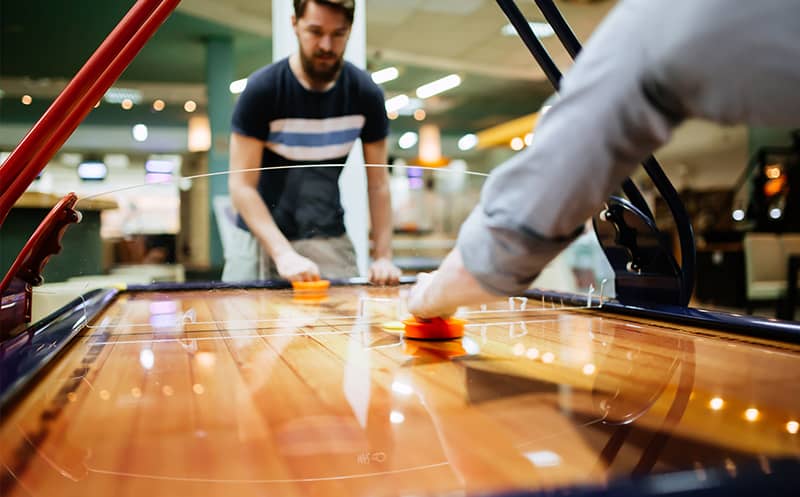Employee Game Rooms Keep Your Business Ahead of the Competition
4 Min Read
Modern businesses often debate whether employee game rooms suit their office space. While some view them as frivolous perks, these lounge spaces can be critical to optimizing office performance and enhancing company culture. Employee game rooms are staples of the world’s top companies due to their team-building effectiveness, recruitment value, and scientifically backed health benefits.

Who’s Ahead of the Curve?
Before diving into the benefits of employee game rooms, let’s highlight some top companies already leveraging them for business success. Industry leaders like Google, Dropbox, Airbnb, Adobe, Intuit, Quicken Loans, and Boston Consulting Group have dedicated spaces for employees to recharge and collaborate in a fun environment.
It’s no coincidence that many of these companies are regularly listed among the Top 100 Companies to Work For. These industry leaders understand the necessity of offering an exceptional working environment to attract and retain top talent.
Game Rooms Build Strong Teams
Yes, employees who can have fun at work are more committed and have much higher levels of creativity, but companies with office games experience even more benefits. Game rooms can bring employees together who might not usually interact and improve employee morale. This interdepartmental socializing is the key to building a great corporate culture. A recent post on The Benefits Guide discusses the benefits of employee engagement. “Game rooms give your employees a place to escape the daily grind and decompress. Workplaces can be stressful. Between work stress and personal issues, your employee’s morale and productivity may suffer.”

Employees who have fun at work are more committed and creative, but companies with office games see even more benefits. Game rooms foster interaction among employees who might not usually interact, improving overall morale. This interdepartmental socializing is crucial for building a solid corporate culture.
A recent article from The Benefits Guide states, “Game rooms give your employees a place to escape the daily grind and decompress. Workplaces can be stressful. Between work stress and personal issues, your employee’s morale and productivity may suffer.”
The benefits of shared breaks extend beyond morale. According to the Harvard Business Review, a team’s energy and engagement outside formal meetings are the most accurate predictors of productivity. Studies across various industries, including post-op hospital wards, innovation teams, financial institutions, and call center teams, confirmed this.
The Harvard Business Review found that communication is the most critical predictor of a team’s success. It matters more than personality, intelligence, and skill combined. Positive engagement outside formal meetings, facilitated by game rooms, creates stronger, more effective teams.
Benefits for Employee Health and Wellness
Employee game rooms also offer significant health benefits. Studies by Brigham Young University professors found that newly formed work teams experienced a 20% increase in task productivity after playing video games together for just 45 minutes.
Use information from wellness programs or employee satisfaction surveys to determine what your employees want. Identify major workplace stress sources and how a game room could alleviate these issues.

Get Up and Move
The science is precise: arcade machines have profound benefits for your employees’ mental sharpness, attention, and sense of well-being. But those aren’t the only upsides of game rooms. Games like ping pong, foosball, and billiards also get your employees up and moving, which doctors say is critical to their physical health.
According to the Mayo Clinic, extended sitting, like at a desk or in front of a computer, can be surprisingly harmful. Doctors analyzed 13 studies measuring sitting time and activity levels. They found that employees who sat for longer than eight hours a day without physical activity faced a risk of dying, similar to the dangers of death observed in patients who were obese or daily smokers.
What Games Does Your Game Room Need?
While board games and puzzles can be time-consuming, arcade machines and interactive games offer quick mental and physical benefits. Popular options include arcade games, pool tables, ping pong tables, and foosball tables. These games can be played in 5 to 15 minutes and provide benefits observed in scientific studies.
Between their recruitment value, impact on team building and communication, mental health benefits, and physical health preservation, employee game rooms are essential for any forward-thinking company.
Sign up for our newsletter to be the first to hear about new releases, product promotions, updates, and more!

James Liess leads marketing and communications for Betson Enterprises. He focuses on working with manufacturing partners to grow awareness of products and services. He has more than 15 years of experience working with global brands in the sports and entertainment industry.

